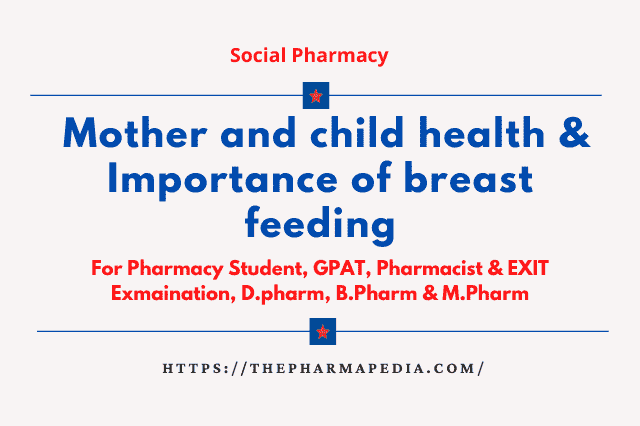Mother health
Health of women throughout pregnancy, childbirth, and the postpartum period is referred to as mother/maternal health.
Most common problems associated with mother injury & death are excessive blood loss, infection, high blood pressure, unsafe abortion, and obstructed labour, as well as indirect causes such as anemia, malaria, and heart disease.
Such mother injury & death can be prevented by a skilled health professional working in a supportive environment.
Child Health
Child’s health includes physical, mental and social well-being.
Most parents know the basics of keeping children healthy, like offering them healthy foods, making sure they get enough sleep and exercise and insuring their safety.
It is also important for children to get regular checkups with their health care provider to check oveall child’s development.
In India, The Child Health programme under the Reproductive, Maternal, Newborn, Child and Adolescent (RMNCH+A) Strategy of the National Health Mission (NHM) comprehensively integrates interventions that improve child health and nutrition status.
Child Health programme under following care are ensured-
- Neonatal and Child Health care
- Nutrition, Micronutrient supplementation (Vitamin A, Iron Folic Acid)
- Management of Childhood Diarrhoeal Diseases & Acute Respiratory Infections
- Immunisation of child
- Management of Prematurity & low birth weight
BENEFITS/IMPORTANCE OF BREASTFEEDING
Breastfeeding is a very important for the health of baby and mother as well as your family and society.
A number of health organizations — including the American Academy of Pediatrics (AAP), the American Medical Association (AMA), and the World Health Organization (WHO) — recommend breastfeeding for the first 6 months as the best choice for babies. Beyond that, breastfeeding is encouraged until at least 12 months, and longer if both the mother and baby are willing.
Breastfeeding helps defend against infections, prevent allergies, and protect against a number of chronic conditions.
In 1992, India adopted the Infant Milk Substitutes, Feeding Bottles, and Infant Foods (IMS) Act which was strengthened in 2003.

1. Fighting infections and other conditions-
During breastfeeding, antibodies and other germ-fighting factors pass from a mother to her baby and strengthen the immune system. This helps lower a baby’s chances of getting many infections, and less hospitalizations than formula-fed infants.
2. Nutrition and ease of digestion.
Breast milk’s components — lactose, protein (whey and casein), and fat — are easily digested by a newborn & have fewer bouts of diarrhea or constipation.
Breast milk also naturally contains many of the vitamins and minerals that a newborn requires. One exception is vitamin D so that all breastfed babies begin receiving vitamin D supplements during the first 2 months and continuing until a baby consumes enough vitamin D-fortified formula or milk (after 1 year of age).
3. Free/Economic
Breast milk doesn’t cost a paisa, while the cost of formula quickly adds up. Also breastfed babies are less likely to be sick, that may mean they make fewer trips to the doctor’s office, so save money indirectly.
Different tastes. Nursing mothers usually need 300 to 500 extra calories per day, which should come from a wide variety of well-balanced foods. This introduces breastfed babies to different tastes through their mothers’ breast milk, which has different flavors depending on what their mothers have eaten. By tasting the foods of their “culture,” breastfed infants more easily accept solid foods.
4. Convenience
Breast milk is always fresh and available whether you’re home or out and about. And when women breastfeed, there’s no need to wash bottles and nipples or warm up bottles in the middle of the night.
5. Smarter babies
Some studies suggest that children who were exclusively breastfed have slightly higher IQs than children who were formula fed.
6. Skin-to-skin contact
Many nursing mothers really enjoy the experience of bonding so closely with their babies. And the skin-to-skin contact can enhance the emotional connection between mother and infant.
7. Beneficial for mother too
Breastfeeding also burns calories and helps shrink the uterus, so nursing moms may be able to return to their pre-pregnancy shape and weight quicker.
Also, studies show that breastfeeding helps lower the risk of breast cancer, high blood pressure, diabetes, and cardiovascular disease, and also may help decrease the risk of uterine and ovarian cancer.
8. Family programme
Lactation suppresses ovulation, leading to lactation amenorrhea which help to prevent pregnancy for family planning.
Download Mother and child health & Importance of breastfeeding.pdf
Also Read…
FORMULA FEEDING & BOTTLE FEEDING
ILL EFFECTS OF INFANT MILK SUBSTITUTES AND BOTTLE FEEDING
Join WhatsApp channel to get latest Job notification, Study material, Previous paper, MCQ quiz, Admission alerts & News etc. for Pharmacy aspirants.
Subscribe our Telegram channel for Pharmacy Notes, MCQ Quiz, , Previous paper, Admission alerts & News etc. for Pharmacy professionals.
Join Telegram group for all Pharmacy books, Pharmacopoeia (IP, USP, BP), Pharmacy Notes, Previous Year Question papers in pdf format.










